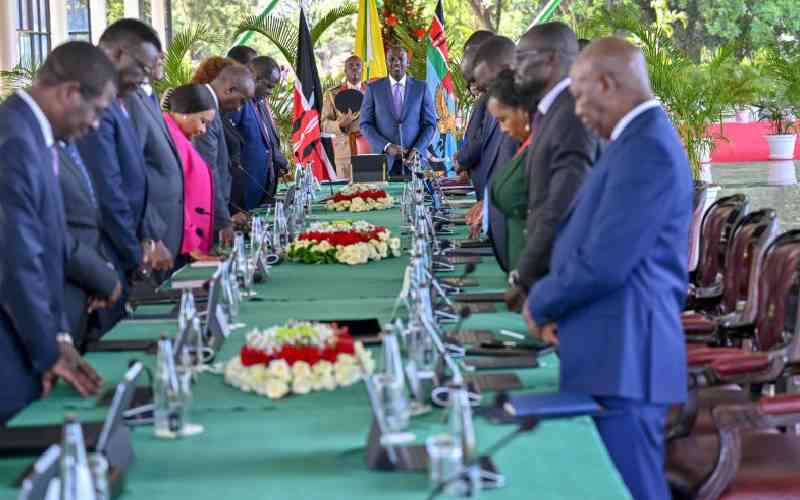
"My concern related to the levels of fluoride and fluorosis, which affected many people in the region. I went to the officer and found that he had received instructions from the governor to wait for me and listen to my ideas," he recalled.
Dr Mwangi is not new to the push for human rights, especially on issues relating to health; his dramatic arrest at his Nakuru clinic last week, and his subsequent detention in police custody for four days, mirrors a similar during the agitation for pluralism.
Three decades ago, police stormed his clinic and arrested him "for offering medical services to government dissidents."
He was taken to the Rift Valley Provincial Criminal Investigations Department (CID) offices, where he was interrogated.
He was held incommunicado for four days before being charged in court with possession of explosive devices.
The doctor shot into the public limelight in the early 1990s, when he offered medical services and treatment to politicians perceived to be dissidents, to the chagrin of the then ruling party.
Lawyers representing opponents of the political establishment would secure court orders facilitating Dr Mwangi to visit their clients in prison and police cells following instances of police torture and brutality.
Only Dr Mwangi was willing to do that, with many others fearing reprisals from the State.
Among the victims he attended to then were former Subukia MP Koigi wa Wamwere and his co-accused, after they were charged with raiding Bahati Police Station to allegedly steal weapons to overthrow the government.
Wamwere had been charged with treason, along with lawyers Mirugi Kariuki and Rumba Kinuthia.
He offered medical services to local opposition MPs like Dr Lwali Oyondi (Nakuru Town), Francis Wanyange (Naivasha) and Njenga Mungai (Molo), who had been critical of the Kanu government.

The three MPs had at one time been arrested for visiting victims of politically instigated ethnic clashes in Maela, Naivasha Constituency.
The medic also offered treatment to over 100 members of the outlawed Mungiki sect who were arrested and charged with illegal oathing, preparation to commit a felony and being members of a proscribed society.
Stay informed. Subscribe to our newsletter
Many other pro-democracy crusaders injured by police officers during anti-government protests would also seek medical services at his clinic.
It is from his medical work that government operatives sought to silence the doctor, whom they said was undermining the government's efforts to crack down on subversive elements.
Dr Mwangi had at the time been conducting several interviews with the British Broadcasting Corporation (BBC) radio over poor living conditions in various prisons and cells, and also on the health status of various torture victims.
"Government operatives were annoyed that I had featured in the same BBC news item with President Moi, who was being interviewed on the human rights situation in Kenya," he said.
The medic would also be invited by leading human rights organisations, including the Kenya National Human Rights Commission, Amnesty International and Africa Watch, to present reports on the plight of political prisoners and the curtailment of their rights to access medical services.
During the interview at his clinic situated at Gate House in Nakuru town's central business district, Mwangi highlighted his over 35-year-old medical journey and spat with the government.
He says he lived up to his professional oath of saving lives and offering medical services to all people regardless of their political persuasion, faith or creed, or their social status.
Records at his clinic indicate that he has offered medical services to slightly over 30,000 patients.
 The Standard Group Plc is a
multi-media organization with investments in media platforms spanning newspaper
print operations, television, radio broadcasting, digital and online services. The
Standard Group is recognized as a leading multi-media house in Kenya with a key
influence in matters of national and international interest.
The Standard Group Plc is a
multi-media organization with investments in media platforms spanning newspaper
print operations, television, radio broadcasting, digital and online services. The
Standard Group is recognized as a leading multi-media house in Kenya with a key
influence in matters of national and international interest.
 The Standard Group Plc is a
multi-media organization with investments in media platforms spanning newspaper
print operations, television, radio broadcasting, digital and online services. The
Standard Group is recognized as a leading multi-media house in Kenya with a key
influence in matters of national and international interest.
The Standard Group Plc is a
multi-media organization with investments in media platforms spanning newspaper
print operations, television, radio broadcasting, digital and online services. The
Standard Group is recognized as a leading multi-media house in Kenya with a key
influence in matters of national and international interest.







